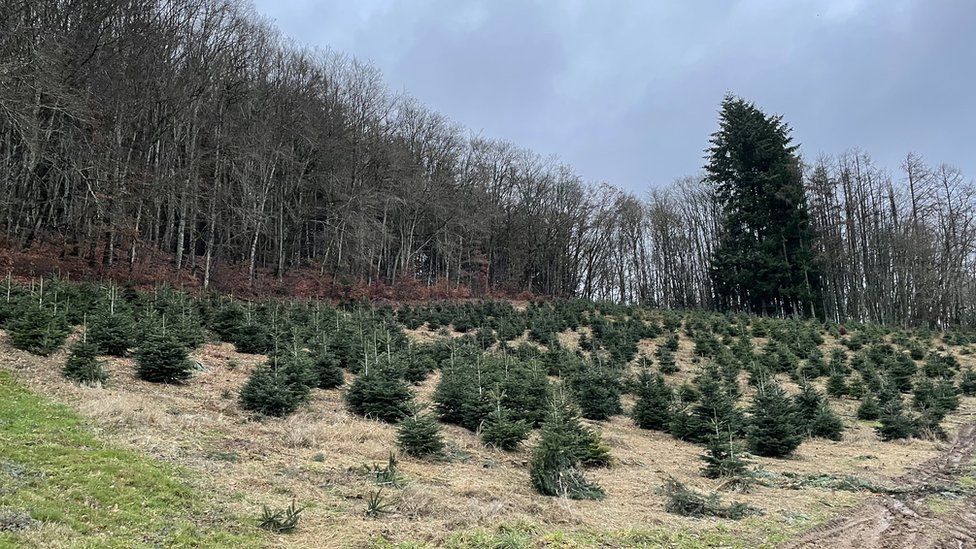ARTICLE AD BOX

Christmas trees - festive decoration or ecological menace?
By Hugh Schofield
BBC News in Burgundy
The eco-ethics of Christmas trees is a subject close to the hearts of many in the Morvan Natural Park.
These remote Burgundy uplands produce more than a million baby firs for the market every year, making the region France's top producer.
But for every local who is happy about the money and jobs created by Christmas trees, there is another who bemoans their impact on the natural environment.
Here, as elsewhere, only a tiny percentage of Christmas tree plantations are run on organic lines.
The vast majority depend on the application of chemical treatments.
And if efforts are certainly being made to reduce the use of herbicides and pesticides, no one seriously disputes their negative effects.
"The production of Christmas trees, because of the use of chemical herbicides, can have an impact on water resources," reads the park's website.
BBC
I have nothing against Christmas trees... But times have changed. We are living through an ecological transition"
"That is why action is being taken to reduce the impact of this activity to a maximum, and make it compatible with high quality water."
That admission by the authorities is the very least of it, according to campaigners.
Muriel André, a local farmer and activist, took us to see what she says is a typical small-scale plantation on a hillside near her home.
A field once used for pasture now contains around 20,000 saplings, planted out by an absent farmer from a neighbouring department, or county.
Around the outer perimeter, grass and weeds grow abundantly, but under the baby trees there is nothing - just earth and some wisps of dead vegetation.
"That is from the herbicides, which they spray to keep down any plant that might offer competition to the trees," she says.
"Then there are the pesticides for insects and fungicides for parasites. It is a monoculture which kills off biodiversity and leaches chemicals into our rivers."
Critics say intensive Christmas tree farming is killing off biodiversity in the region
"I have nothing against Christmas trees. I have my own fond memories of decorating them as a girl," Ms André says.
"But times have changed. We are living through an ecological transition. Everything that pollutes has got to stop.
"People in cities are fooled by the marketing which tells them that Christmas trees are 'natural' - as if they're all from some magic forest. The reality is that it's a form of intensive agriculture."
It is not just environmental campaigners who are questioning the ethics of Christmas trees.
French consumers are also increasingly curious about the provenance of their Nordmanns and Epiceas.
Is it responsible, they are asking, to fast-track millions of baby trees only for them to be cut down and kept in living rooms for perhaps a fortnight?
Speaking to passersby near a tree-supplier's in central Paris, everyone we questioned said that the environment was now an important factor in their choice of whether to have a sapin de Noël.
Some said they had definitively stopped buying them. For others it was a quandary. While recognising the environmental impact of plantations, they wondered whether importing a plastic tree from China was really a better alternative.
Few had considered "green" alternatives such as wooden tree sculptures or home-made assemblies.
BBC
All the criticism we get is built on a total ignorance of our practices today
According to producers in the Morvan, buyers are certainly growing more inquisitive about the origin of their trees. But so far that has had only a marginal effect on sales.
At the Naudet company in Planchez, which has been cultivating Christmas trees since 1956, they admit that in the past little attention was paid to the problems of herbicides. But that has changed, they say.
"All the criticism we get is built on a total ignorance of our practices today," said director-general Martin Naudet.
"We are making huge efforts to minimise our use of chemicals, and you can see in our plantations today that there is plenty of biodiversity."
In one nearby plantation, we were shown lines of trees where the under-grass did indeed appear to be rich and abundant. In another field, they were experimenting with sowing buckwheat (sarrasin) between the lines, which serves as a natural weed-suppressant.
Martin Naudet points out that only 1% of viable agricultural land in the Morvan is given over to Christmas trees. In the vast expanse of hills and forests, the plantations are only a small part of the landscape.
But the fact remains that virtually no Christmas tree production is chemical-free. "People tried," says Martin Naudet. "But the trees don't sell. They're too expensive and they don't look right."
In other words, our Christmas evergreens are actually not that "green" at all.

 1 year ago
18
1 year ago
18








 English (US) ·
English (US) ·